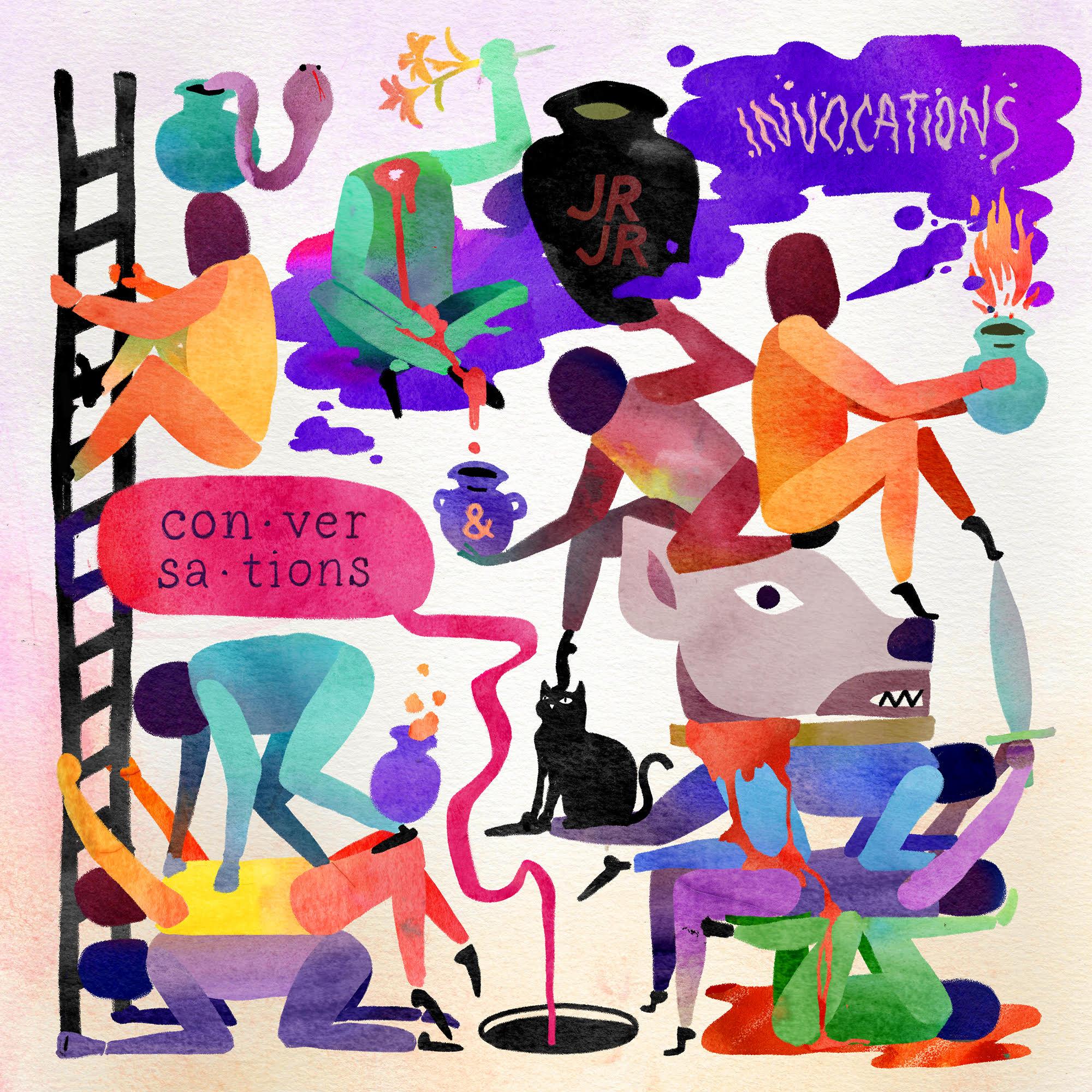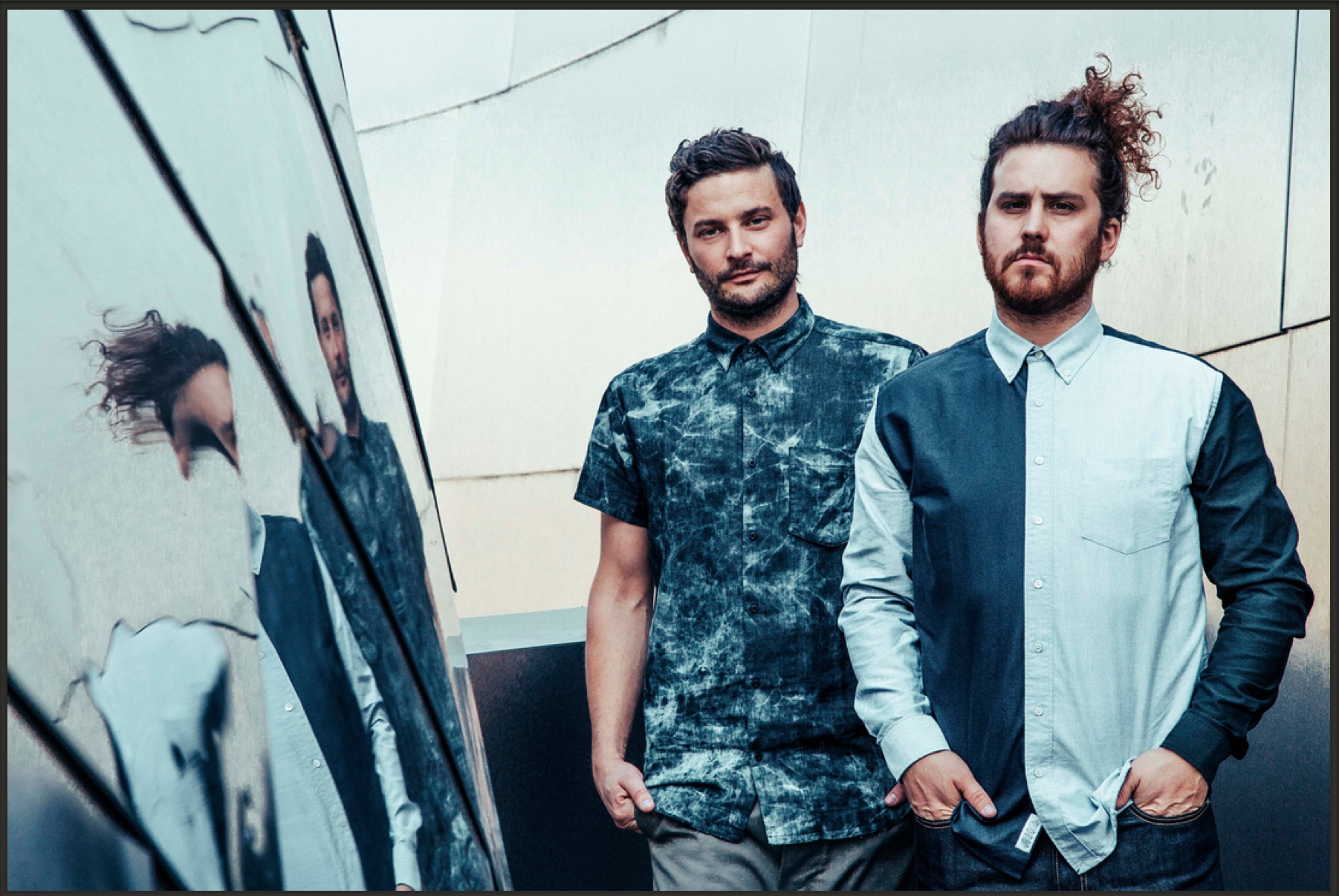A double album in a digital age is itself a talking point. It shouldn't be.
For JR JR, there's no statement being made here, other than the fact that they've created a lot of music in response to the last four years of personal and political chaos. A double album? They just happened to have that much material ready to go. Why wait when they're ready to release and move on?
More than anything, Joshua Epstein says the duo formerly known as Dale Earnhardt Jr Jr is only concerned with being authentic to their own calling. That means preserving the format they believe in and releasing things as they wish (thanks to their own new label). If it results in a double album like Invocations / Conversations, so be it.
Fortunately, the duo's authenticity has resulted in some of the best pop music being crafted today. The new double LP is part Paul McCartney, part Sufjan's Age of Adz. For listeners willing to wade through so much material, the rewards are overwhelming. It's an abundance of riches bestowed all at once.
We recently sat down with Epstein to ask him about the band's new label, the album format and the cost of being authentic or even worse—losing yourself.
Analogue: There's a lot to discuss with the new double album, but my first thought is that in this day and age, it feels like a move from a band that feels free. Like, in the middle of a short attention span culture, you guys have just said, "Screw it. Have at this, fans!" Is that at all the thought process here or am I foolishly off?
Joshua Epstein: Man, that's a really good question. I'm of two minds with it, you know? I totally understand why people want things that are meme-able. I had ADHD so I can look back on my own preferences for consuming music when I was younger—and this is even before streaming services—and I can like a band because of one song. It's always been that way. If I hear something that blows my mind, I'm going to be a fan forever, even if the band then makes no other songs that I ever care about. I'll still like them because I like that one song.

There's nothing wrong with the way that people consume music now, but I think about what if my favorite artist tried to make things meme-able? What if The Beatles were concerned with making meme-able music? Maybe it would have been great, but maybe not. [Laughs] I don't know.
It's an interesting place that we're in. Personally I'm realizing what a lot of the internet is bringing to my life isn't making it better. When I was super young, alternative music was thriving and it was thriving as a counterpoint to popular music and culture. If you had a line drawn on a piece of paper, alternative was on the left and popular was on the right and they were reactions to the other. Now if I'm listening to alternative on streaming sites, they're closer than ever. Alternative music isn't necessarily trying to counter popular music, but popular music is trying to include alternative artists into their creative process. Now there's no distinction so everyone just wants to be super popular. Maybe the next wave of alternative music will go back in time to where there's a counterpoint to current music.
All of that is to say that probably a lot of people aren't going to listen to the entire double album that we're putting out, but I think it's a way of preserving the art form that I believe in.
Analogue: As in the full-length album?
Joshua: Yeah. It's not helpful for me to spend a bunch of time on the internet. It's more helpful for me to read books. I know that seems novel or antiquated at this point in time, but for my own mental health, it makes me feel better. I'm hopeful there will be people who course correct. We're going so far in terms of an everything now internet, and I don't think it's necessarily making our lives better. Politically, the world is a mess. Emotionally, the world is a mess.
In the old days, a lot of religions were reacting to these things that could get you in trouble, because if you do them without regulating the use, they could mess with you—alcohol or drugs. Doing them unchecked is bad for you. When you think about Facebook and all these companies that are trying to make kids addicted to the internet and give them the same physiological response as these other stimulants, there's going to have to be some course correction or we'll all end up these zombie addicts.
"I think artists get in trouble when they change who they are to be a part of the current era."
I also think about my favorite artists and they've been aware of what's going on around them but they also maintained an authenticity or personality. I realize that it's not going to work for me in terms of authenticity to try to engage with a lot of the disposable forms of music. That's not the way I feel about music. I feel you should try to make things that are permanent for the most part, so it would be inauthentic to try and just make one thing that is referencing a phrase in that moment, a tweetable lyric or something like that.
I think artists get in trouble when they change who they are to be a part of the current era. Madonna's early albums are so great and then at some point, she tried to chase the current sound in a way that I don't remember Paul Simon or David Byrne doing.
Analogue: So it's less about making a calculated statement and more about learning to be true to self.
Joshua: Yeah, but I also don't want us to not be successful. [Laughs] I think after putting out this double album, we'll put out songs as we write them for a while because it's cool to not have to wait so long between releases. But this time, we did wait so long between releases, it didn't make sense to put out one song. "Hey, we've been away for a year-and-a-half, so here's a song." [Laughs] People would ask, "Well, what did you do for that year-and-a-half?" Now we can say, "Well, here's a lot of songs." Then we'll figure it out after.
Analogue: Did you get push back from industry savvy folks saying, "Don't do it"?
Joshua: Yeah, but I think that good things find their audience. It just takes a little more time. I think that always happens. If this is the end of our career, then maybe in 20 years, someone will say, "Oh, that was actually pretty cool." [Laughs]

Analogue: I'm glad we landed here, because I love your optimism on that last point and I feel like that's a real touchpoint with several of the songs as well.
Joshua: It's interesting because the first album, Invocations, was written right at the same time as the election. It was not a choice. It just happened that way. We were working at the Masonic Temple in Detroit which is this beatiful, gigantic Masonic lodge. It's amazing. We were writing with the guys we tour with—Mike Higgins and Brian Pope—as a band. I just remember the election happened and the next day, we came in and it was like, "Holy crap." I think we were all stunned.
I think it's dangerous for us to project our own values onto other people and to an extent, that's what polite society has done to people. It's inoculated them from having to have their opinions questioned. My grandparents always said not to talk about politics or religion with people, but that only protects people who have terrible opinions. [Laughs] Everyone should be challenged and questioned so that we have discussions about what's right and wrong, real or not.
All of that was hitting us at the same time, so that album feels a little less hopeful to me, since it's our struggle to try to find some hopefulness in it. Conversations is the year following processing that and I think that's more optimistic. You have to react with optimism or else everyone is doomed.
Analogue: You put in the work to form your own label for this. What does that enable you to do from here on out?
Joshua: We wanted to have the control to do everything on our own timeline. When you're on a label, they're also releasing other things. If you finish something, maybe it comes out relatively quickly but maybe it comes in a year. That's something that was just blocking our flow. After this double album, we'll just put music out in real-time for a while and then make them into collections or maybe even our own playlists after. I think it was just very necessary.
Plus at some point I'd love to help some younger bands navigate their way through all of this and be a creative partner. It'd be nice to have a home to be able to do that for them. Obviously we have to figure out releasing our own stuff for a minute and get that dialed in, but eventually I think that's a goal. We've learned a lot of lessons and it'd be awesome to be able to guide someone through all of this that we really believe in.
VISIT: JR JR

